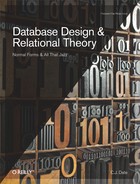Statements to the effect that every FD is a JD, or that (as I put it in Chapter 9) JDs are a kind of generalized FD, are quite common in the less formal parts of the literature; indeed, I’ve said such things myself in previous books and other previous writings. But such talk is strictly incorrect. It would be better to say that every FD implies a JD (which in fact is something we already know to be the case from Heath’s Theorem). In other words, if R is subject to a certain FD, F say, then it’s certainly subject to a certain JD, J say. However, the converse is false—R can be subject to that same JD J without being subject to that same FD F, as I now show:
Let relvar R have attributes A, B, and C (only), let F be the FD AB → C, and let R be subject to F (Heath notation once again).
By Heath’s Theorem, then, R is subject to the JD
 {ABC,AB}. (With reference to the formulation of Heath’s Theorem given in Chapter 9, take X to be AB, Y to be C, and Z to be the empty set of attributes.) Call this JD J.
{ABC,AB}. (With reference to the formulation of Heath’s Theorem given in Chapter 9, take X to be AB, Y to be C, and Z to be the empty set of attributes.) Call this JD J.But this JD J is trivial—it holds in every relvar R that has heading ABC, regardless of whether that relvar is subject to the FD AB → C.
